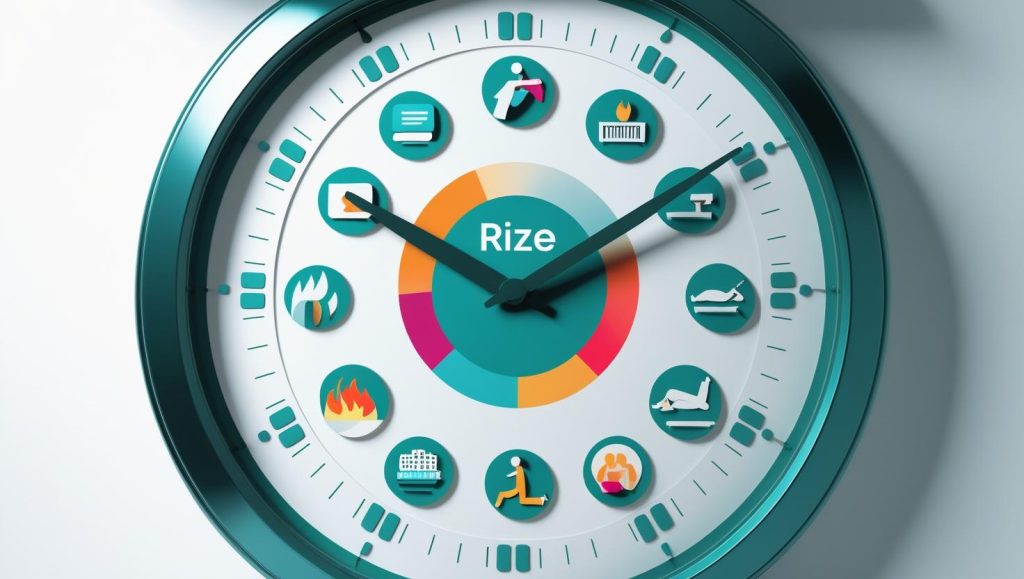We often think of habits as things we set intentionally—like waking early, journaling, or meditating. But for knowledge workers, many of our most dominant habits happen passively: checking email, bouncing between tabs, and losing half the day to meetings. The question is—how do you track what you don’t even notice?
Rize answers that with ruthless clarity. Unlike most habit apps that ask what you want to do, Rize shows you what you’re actually doing. And then, it helps you shift your behavior using time-based truth—not wishful planning. For many knowledge workers, this kind of visibility is the foundation for better focus and long-term habit redesign.
Your real habits are already in your calendar
Here’s the truth: your current routines are already embedded in your day. If you check Slack 80 times, toggle between emails, or squeeze deep work into fragmented 20-minute windows, then you’re already living inside a habit system—just an unintentional one.
As we explored in our deep dive on AI-powered habit design, the real challenge isn’t starting new habits—it’s becoming aware of the unconscious ones stealing your time and attention.
Rize tackles this head-on by operating like a digital mirror. It tracks how your computer is used—apps, websites, time spent—and builds habit insights based on real-world behavior patterns. The result? You don’t guess when you’re focused. You know.
What makes Rize different from traditional habit tools
Most habit trackers—whether it’s Loop, Productive, or Habitica—rely on user input. You check boxes, set reminders, maybe earn some streaks. It’s helpful, but often incomplete. Rize takes a different approach entirely:
| Feature | Traditional Trackers | Rize |
|---|---|---|
| Manual Input | Required | Optional / Minimal |
| Behavioral Insights | Rare | Core Feature |
| Real-Time Feedback | No | Yes |
| Time Categorization | Basic | Advanced |
It’s not just another habit tracker—it’s an attention diagnostics tool. While RescueTime helps you monitor focus levels and Motion helps you schedule deep work, Rize works like a microscope. It observes your behavior and reflects it back with minimal friction.
Key features that power behavioral clarity
- Passive Tracking: Monitors app usage and browser activity in the background, tagging sessions by type—focus, communication, meetings, distractions, or breaks.
- Daily Focus Scores: Offers a 1–100 rating that quantifies your cognitive alignment each day.
- Weekly Habit Reports: Visual breakdowns showing where your time actually went—ideal for spotting trends and setting new routines.
- Distraction Alerts: Real-time nudges when you context-switch too frequently, helping break reactive loops.
Within days of using Rize, most professionals encounter at least one “aha” moment. Maybe it’s realizing how often they shift focus, or discovering that meetings have consumed their best cognitive windows. Either way, Rize delivers the data you didn’t know you needed.
Why knowledge workers need this kind of insight
The problem isn’t goal-setting—it’s self-awareness. Rize exposes:
- Unconscious multitasking: Pinpoints when and how you’re breaking flow.
- Time misalignment: Identifies when admin and meetings are stealing high-energy hours.
- Habits by default: Surfaces patterns that feel “normal” but erode productivity.
Armed with this clarity, you can make smarter habit shifts—like scheduling deep work where it fits naturally, bundling communication tasks, or preserving your cognitive peaks.
This behavioral feedback loop supports the very principles outlined in our article on peak mental performance: measure, adjust, optimize, repeat.
How Rize fits into your broader productivity stack
Rize is powerful alone—but when paired with tools like Motion or RescueTime, the effect is multiplied:
- Use Motion to structure your day based on priorities
- Use Rize to monitor how that day actually unfolds
- Use RescueTime to receive nudges and track improvements
Together, they create a feedback cycle of planning, execution, and behavioral refinement—helping knowledge workers move from reactive effort to deliberate performance.
Pros and current limitations
What users love:
- No-friction install—once active, it works automatically
- Minimal upkeep—zero manual logging required
- Data clarity—clear weekly summaries of real behavior trends
Areas for improvement:
- No mobile tracking yet—limited to desktop environments
- Few integrations—can’t currently sync with Notion, Trello, or external calendars
- Premium required for full insight—basic plan is functional, but limited (~$12/month)
Still, for the majority of professionals, the ROI from one week of improved time usage more than covers the cost.
Final verdict: reflect, adjust, evolve
Rize isn’t trying to motivate you with flashy gamification. It doesn’t ask for your goals—it shows you your behavior. And for knowledge workers navigating distraction-rich environments, that self-awareness is gold.
In a world where time is fragmented and energy is drained by invisible habits, Rize offers a clear path forward: reflect on your real day, not your ideal one. Adjust your systems. Then evolve with clarity.
If you’re serious about habit design, start not with intention—but with attention. Rize makes that possible—with elegance, intelligence, and zero fluff.



